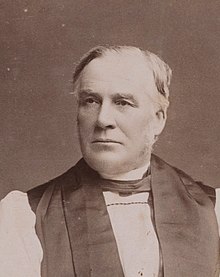Saumarez Smith
Saumarez Smith | |
|---|---|
| Bishop and Archbishop of Sydney | |
 Smith, c. 1897 | |
| Church | Church of England |
| Province | New South Wales |
| Diocese | Sydney |
| In office |
|
| Predecessor | Alfred Barry |
| Successor | John Wright |
| Other post(s) | Primate of Australia (ex officio) |
| Previous post(s) |
|
| Orders | |
| Ordination | 19 June 1859 (as deacon) 3 Jun 1860 (as priest) |
| Consecration | 24 June 1890 |
| Personal details | |
| Born | William Saumarez Smith 14 January 1836 |
| Died | 18 April 1909 (aged 73) Sydney |
| Denomination | Anglican |
| Parents |
|
| Spouse |
Florence Deedes (m. 1870) |
| Children | 8 |
| Education | |
| Alma mater | Trinity College, Cambridge |
| Coat of arms |  |
William Saumarez Smith (known as Saumarez;[1] 14 January 1836 – 18 April 1909) was an Anglican Archbishop of Sydney, Australia.[1]
Life
[edit]Smith was born in Saint Helier, Jersey the eldest twin son of the Lieutenant Richard Snowden Smith (later a clergyman) and his wife Anne, née Robin.[1] Smith was educated at Windlesham House School, Marlborough College and Trinity College, Cambridge, where he graduated B.A. with first-class honours in classics and theology in 1858.[2] He was Crosse theological scholar in 1859, Tyrwhitt Hebrew scholar in 1860, and on two occasions won the Seatonian prize for poetry. He graduated M.A. in 1862, B.D. in 1871, D.D. in 1889, and was a fellow of Trinity College, 1860-70.[3]
Smith was ordained a deacon on 19 June 1859 and priest on 3 Jun 1860;[1] he was vicar of Trumpington, 1867–69, and principal of St Aidan's Theological College, 1869-90. He was consecrated bishop of Sydney and Primate of Australia at St Paul's Cathedral, London, on 24 June 1890, and became archbishop in 1897. At Sydney his episcopate was notable mainly for a great increase in missionary work, and the home mission fund was also established. There was some advance in education; Moore Theological College was reopened, and the Church of England Grammar School For Girls was established in his period. Smith was always accessible to his clergy and always glad to keep in touch with his parishes. Though an extreme evangelical he was broadminded and an advocate for the union of the churches; and though essentially a man of peace, he spoke strongly against gambling and other evils. Smith had a dislike of ceremonial, a passion for accuracy, and was a fine scholar and linguist, interested also in astronomy and botany.
Smith died of cerebral haemorrhage at Sydney on 18 April 1909; he married in 1870 Florence, daughter of the Rev. Lewis Deedes, who died in 1890, and was survived by a son and seven daughters.[1]
Smith was the author of The Bible, its Construction, Character and Claims (1865), 'Capernaum, A Seatonian Poem' (1865), Obstacles to Missionary Success (1868), 'The Disciples, a Seatonian Poem' (1869), Christian Faith, Five Sermons (1869), Lessons on Genesis (1879), The Blood of the New Testament (1889). In 1911 his verses were collected and published posthumously under the title, Capernaum and Other Poems.
References
[edit]- ^ a b c d e K. J. Cable, 'Smith, William Saumarez (1836 - 1909)', Australian Dictionary of Biography, Vol. 11, MUP, 1988, pp 675-677.
- ^ Malden, Henry C. (1902). Muster Roll. Windlesham House, Brighton. A.D. 1837 to 1902 (2nd ed.). Brighton: H. & C. Treacher.
- ^ "Smith, William Saumarez (SMT854WS)". A Cambridge Alumni Database. University of Cambridge.
- Serle, Percival (1949). "Smith, William". Dictionary of Australian Biography. Sydney: Angus & Robertson.
External links
[edit]![]() Media related to Saumarez Smith at Wikimedia Commons
Media related to Saumarez Smith at Wikimedia Commons
- Capernaum and Other Poems, a digitized copy of the first edition from Internet Archive.
